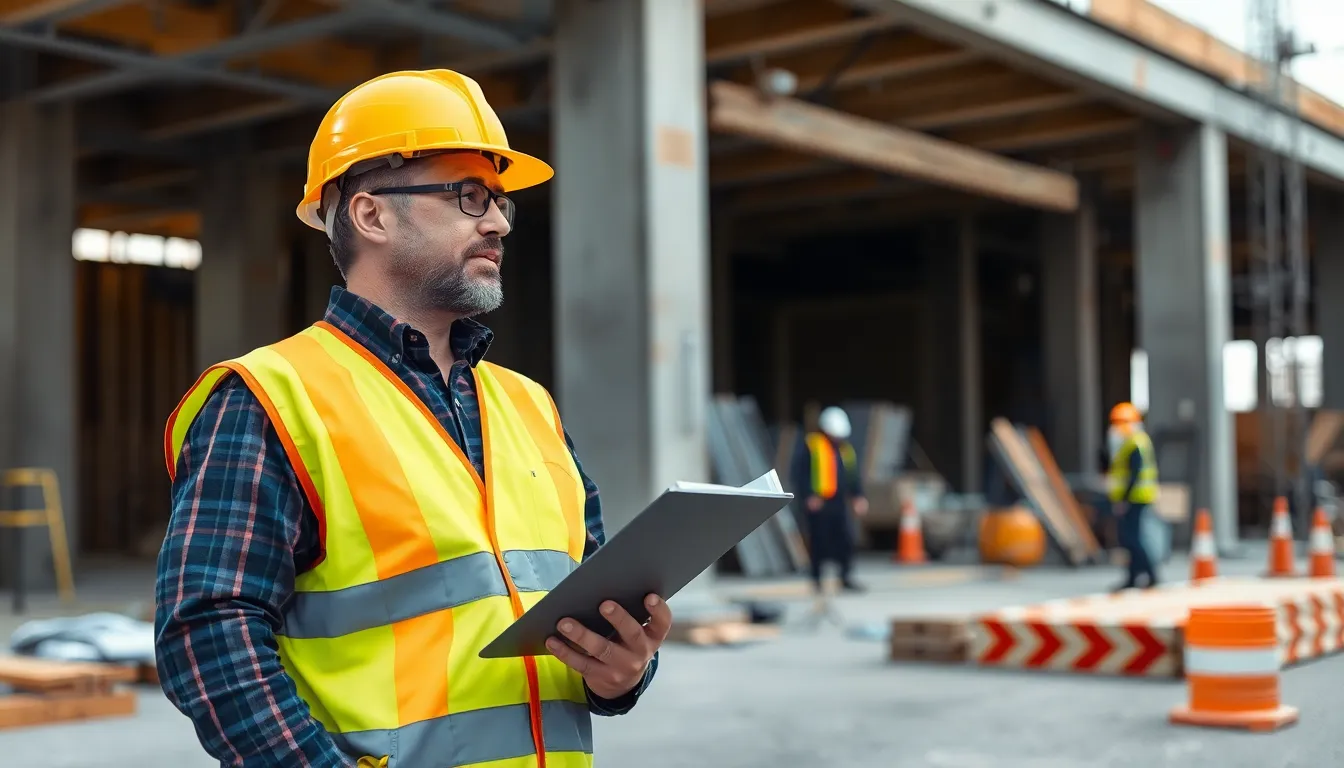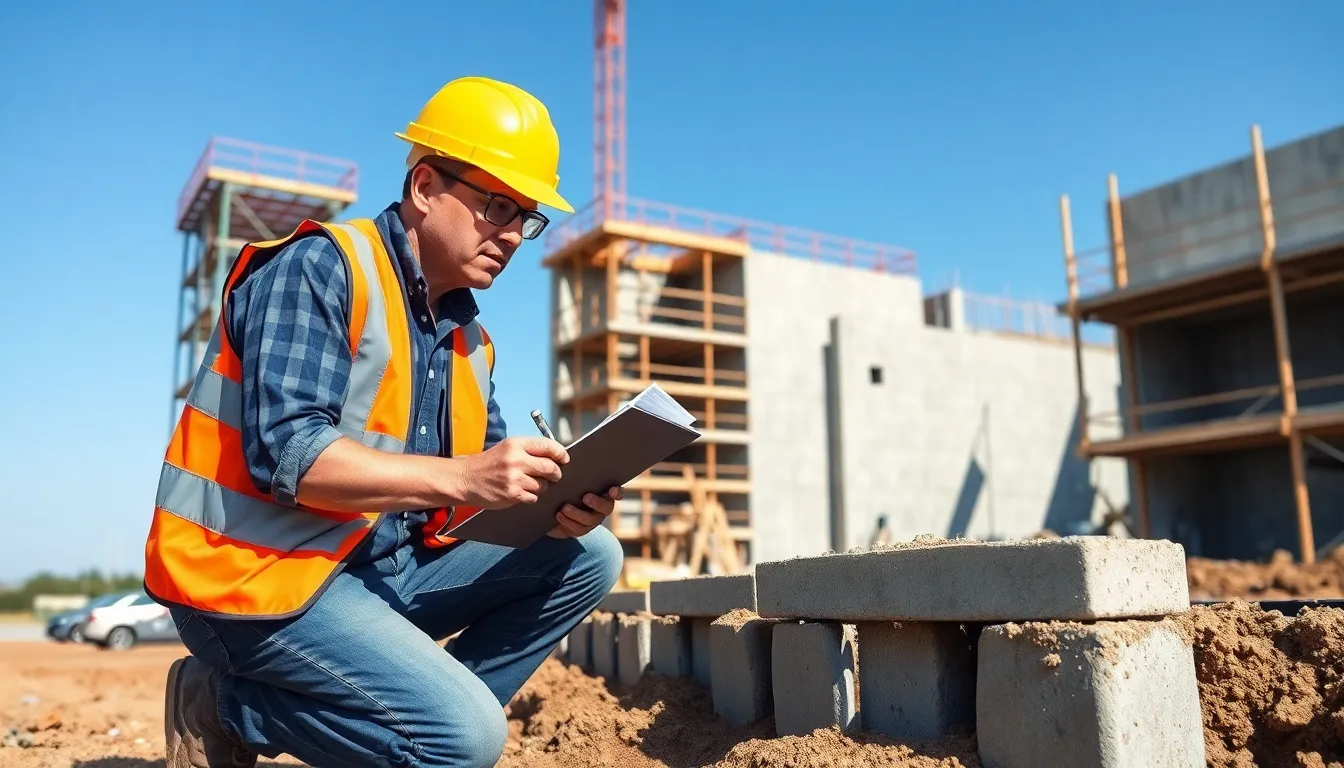In a world where skyscrapers touch the clouds and homes are built to withstand the test of time, construction and building inspectors are the unsung heroes ensuring everything is up to snuff. Imagine a job where you get to wear a hard hat and wield a clipboard like a superhero with a cape—except instead of saving the world, you’re saving it from shoddy work and potential disasters.
Table of Contents
ToggleOverview of Construction And Building Inspector
Construction and building inspectors play a crucial role in the safety and quality assurance of structures. They evaluate compliance with building codes, zoning laws, and other regulations throughout the construction process. Inspectors conduct assessments at various stages, including pre-construction, during building, and post-completion.
Responsibilities include examining building plans, conducting on-site inspections, and preparing detailed reports on findings. Evaluations check for structural integrity, electrical and plumbing systems, fire safety, and overall building functionality. Inspectors often collaborate with architects, engineers, and contractors to ensure guidelines are followed to avoid costly mistakes.
The importance of building inspectors cannot be understated. They act as a safeguard, protecting public safety and health. Their expertise helps prevent issues that could arise from non-compliance or substandard construction practices.
Certain qualifications enhance a construction and building inspector’s effectiveness. Many hold certifications from recognized organizations, such as the International Code Council (ICC) or National Association of State Contractors Licensing Agencies (NASCLA). Inspectors are familiar with local, state, and federal regulations that govern construction.
Career pathways for building inspectors often start in the construction field, with experience in carpentry, plumbing, or electrical work proving beneficial. Continuous education and training keep inspectors updated on evolving codes and techniques in the industry. Effective communication skills are essential, enabling inspectors to relay findings clearly to various stakeholders.
Ultimately, building inspectors embody a commitment to high standards in construction, improving safety for occupants and the surrounding community. Their attention to detail and thorough evaluations foster a trustworthy construction environment.
Roles And Responsibilities

Construction and building inspectors ensure structures meet safety and quality standards. Their roles involve several key processes and tasks that maintain public safety and compliance with regulations.
Inspection Processes
Inspectors assess construction sites systematically to verify adherence to building codes and regulations. Each evaluation includes examining structural elements, mechanical systems, and finishes. Visual inspections reveal potential issues that might not meet specified standards. During the process, inspectors collaborate with contractors and engineers to address any discrepancies. Scheduling inspections at various construction phases helps in identifying issues early, reducing costly modifications later.
Reporting Findings
After inspections, detailed reports document findings and highlight areas needing attention. Inspectors summarize their evaluations methodically, outlining compliance levels and noting any code violations. Clear communication in their reports aids stakeholders in understanding necessary actions. Inspectors deliver these reports to contractors and project managers promptly to ensure timely resolution of identified problems. Adherence to reporting standards ensures all involved parties remain informed and accountable during the construction process.
Required Qualifications
Construction and building inspectors require specific qualifications to perform their roles effectively. These qualifications focus on education, training, and certifications.
Education And Training
A high school diploma or equivalent serves as the minimum educational requirement for construction and building inspectors. Many pursue further education in construction management or building technology, which enhances knowledge of building codes and regulations. Training often occurs through apprenticeships, on-the-job experience, or formal programs. Understanding construction methods and principles is crucial for inspectors to identify issues. Familiarity with electrical systems, plumbing, and structural design strengthens their ability to conduct thorough evaluations.
Certifications
Certifications play a significant role in establishing credibility among inspectors. Various organizations, such as the International Code Council (ICC) and the National Institute of Certification in Engineering Technologies (NICET), provide recognized certifications. Obtaining these certifications often requires passing examinations that demonstrate expertise in specific areas. Many states mandate certification for building inspectors to ensure protection of public safety. Ongoing education and renewal of certifications help inspectors stay current with changing regulations and standards, reinforcing their qualifications.
Skills And Competencies
Construction and building inspectors require a blend of skills and competencies for successful evaluations and inspections. Essential abilities include attention to detail and problem-solving.
Attention To Detail
Attention to detail remains crucial for inspectors. They meticulously examine construction components to ensure compliance with codes and regulations. Consistency in observations prevents small issues from escalating into significant problems. Inspectors focus on every aspect, including structural integrity, safety features, and material quality. Clarity allows them to identify code violations that others might overlook. Each inspection demands thorough evaluations, forming the foundation of safety for future occupants. Accuracy in reporting their findings offers builders and contractors essential insights. Inspectors who prioritize detail ultimately enhance overall project quality.
Problem-Solving Abilities
Problem-solving abilities stand out as a necessary competency for inspectors. During inspections, they often encounter unexpected challenges requiring quick solutions. An effective inspector assesses issues on-site and collaborates with contractors to devise practical fixes. Challenges may include identifying subpar workmanship or assessing structural discrepancies. Inspectors analyze these problems systematically to determine compliant resolutions. Creative thinking enables them to propose alternatives that meet safety standards without hindering timelines. Resolving conflicts between design and construction enhances project efficiency and minimizes costly delays. Skilled inspectors contribute significantly to maintaining the integrity of construction processes with their problem-solving expertise.
Career Opportunities
Career opportunities for construction and building inspectors exist across various sectors. Inspectors find roles in government agencies, private firms, and non-governmental organizations. Many of them work at the local level, ensuring compliance with building codes and safety regulations.
Positions are often available in residential and commercial construction. Inspectors also assess industrial projects, ranging from factories to warehouses. Employment settings frequently include annual inspections and ongoing oversight for large-scale developments.
Experience in trades provides a solid foundation for advancing in this field. Inspectors with backgrounds in electrical, plumbing, or carpentry often excel in assessments due to their firsthand knowledge. Knowledge in structural engineering enhances an inspector’s credibility, expanding job prospects in specialized areas.
Salary ranges vary based on experience and location. According to the U.S. Bureau of Labor Statistics, inspectors earn a median salary of approximately $62,000 per year. Potential for overtime can further increase earnings, especially during peak construction seasons.
Career progression often leads to managerial roles, such as overseeing inspection teams or serving as compliance officers. Many inspectors pursue additional certifications to enhance their qualifications. Specialized training in environmental regulations or safety standards can also broaden job opportunities.
Networking plays a pivotal role in advancing careers. Professionals often join industry associations to connect with peers and stay informed about best practices. Attending workshops and conferences creates avenues for growth and development in the field.
Overall, the landscape for construction and building inspectors presents diverse opportunities for career advancement and professional growth.
Construction and building inspectors are essential to ensuring safety and quality in the construction industry. Their expertise not only helps prevent potential disasters but also contributes to the overall integrity of buildings. With a strong foundation in regulations and continuous education, these professionals play a pivotal role in maintaining high standards.
The diverse career opportunities available to inspectors reflect the growing need for skilled individuals in this field. As they navigate challenges and collaborate with various stakeholders, their problem-solving abilities and attention to detail remain crucial. Ultimately, construction and building inspectors are key players in creating safe environments for communities, making their role both impactful and rewarding.






